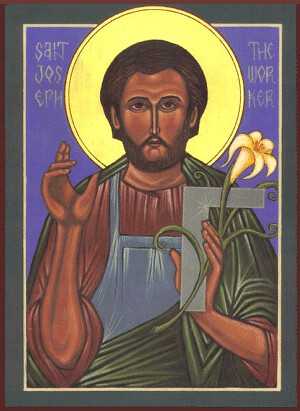Catholic Charities. Providing Help. Creating Hope.
VISION: Believing in the presence of God in our midst, we proclaim the sanctity of human life and the dignity of the person by sharing in the mission of Jesus given to the Church. To this end, Catholic Charities works with individuals, families, and communities to help them meet their needs, address their issues, eliminate oppression, and build a just and compassionate society.
MISSION: Rooted in the Mission of the Diocese of Youngstown "to minister to the people in the six counties of northeastern Ohio . . .(and) to the world community", we are called to provide service to people in need, to advocate for justice in social structures, and to call the entire Church and other people of good will to do the same.
GOALS: Catholic Charities is devoted to helping meet basic human needs, strengthening families, building communities and empowering low-income people. Working to reduce poverty in half by 2020.
KEY VALUE: Hospitality
WHAT WE DO: Organizing Love. "As a community, the Church must practise love. Love thus needs to be organized if it is to be an ordered service to the community" (Deus Caritas Est, par. 20)
http://www.arlingtonrenewal.org/files/Christ_the_True_Vine_icon_Athens_16th_century.jpg
In Catholic Charities http://www.ccdoy.org , we are solidly rooted in the mission of the Church to bring Good News and help organize love in the world. As a ministry of the Church, Catholic Charities empowers others to help live out the commandment to love one another. Gifts to the Bishop’s Annual Appeal for Catholic Charities and Church https://secure.acceptiva.com/?cst=450afc are one way which volunteers, staff and others of good will can continue to support the mission and ministry of the Church to bring abundant life to those around us, especially those in need.
Reflection from Church Documents and Official Statements
 "Exodus
to the great cities, armed conflict, hunger and pandemics, which affect
so many people, give rise to new forms of poverty in our time. The
global economic crisis has caused an increasing number of families to
live in precarious conditions. When the manufacture and increase of
needs leads us to believe in the possibility of unlimited enjoyment and
consumption, the lack of the means necessary to achieve these ends leads
to frustration. ... When poverty coexists with enormous wealth, a sense
of injustice arises which can become a source of rebellion. Therefore
it is necessary for States to ensure that legislation does not increase
social inequality and that people can live dignified lives".
"Exodus
to the great cities, armed conflict, hunger and pandemics, which affect
so many people, give rise to new forms of poverty in our time. The
global economic crisis has caused an increasing number of families to
live in precarious conditions. When the manufacture and increase of
needs leads us to believe in the possibility of unlimited enjoyment and
consumption, the lack of the means necessary to achieve these ends leads
to frustration. ... When poverty coexists with enormous wealth, a sense
of injustice arises which can become a source of rebellion. Therefore
it is necessary for States to ensure that legislation does not increase
social inequality and that people can live dignified lives". Some important date(s) this week:
http://www.americancatholic.org/Features/Saints/ByDate.aspx
See website for biographies of Saints and Blessed celebrated this week.
http://www.usccb.org/images/USCCB.gif
 Forced
to quit school at age 13 to work on the family farm, Joseph entered the
Congregation of the Sacred Hearts of Jesus and Mary six years later,
taking the name of a fourth-century physician and martyr. When his
brother Pamphile, a priest in the same congregation, fell ill and was
unable to go to the Hawaiian Islands as assigned, Damien quickly
volunteered in his place. In May 1864, two months after arriving in his
new mission, Damien was ordained a priest in Honolulu and assigned to
the island of Hawaii.
Forced
to quit school at age 13 to work on the family farm, Joseph entered the
Congregation of the Sacred Hearts of Jesus and Mary six years later,
taking the name of a fourth-century physician and martyr. When his
brother Pamphile, a priest in the same congregation, fell ill and was
unable to go to the Hawaiian Islands as assigned, Damien quickly
volunteered in his place. In May 1864, two months after arriving in his
new mission, Damien was ordained a priest in Honolulu and assigned to
the island of Hawaii.In 1873, he went to the Hawaiian government's leper colony on the island of Molokai, set up seven years earlier. Part of a team of four chaplains taking that assignment for three months each year, Damien soon volunteered to remain permanently, caring for the people's physical, medical and spiritual needs. In time, he became their most effective advocate to obtain promised government support.
Soon the settlement had new houses and a new church, school and orphanage. Morale improved considerably. A few years later he succeeded in getting the Franciscan Sisters of Syracuse, led by Mother Marianne Cope (January 23), to help staff this colony in Kalaupapa.
Damien contracted Hansen's disease and died of its complications. As requested, he was buried in Kalaupapa, but in 1936 the Belgian government succeeded in having his body moved to Belgium. Part of Damien's body was returned to his beloved Hawaiian brothers and sisters after his beatification in 1995.
Damien was canonized by Pope Benedict XVI on October 11, 2009.
When Hawaii became a state in 1959, it selected Damien as one of its two representatives in the Statuary Hall at the U.S. Capitol.
CHARITIES NEWSBYTES
Corporal Works of Mercy: The seven practices of charity toward our neighbor
|
Note: Please consider joining our
FACEBOOK CAUSE http://apps.facebook.com/causes/106889
FACEBOOK GROUP https://www.facebook.com/pages/Catholic-Charities-Diocese-of-Youngstown/138817639487339
TWITTER account, CCDOY, http://twitter.com/CCDOY
for current updates and calls to action that we can all use.
See our website at www.catholiccharitiesyoungstown.org for links to the our ministries and services.
For more information on Catholic Social Doctrine and its connection to our ministries, visit my blog at: http://corbinchurchthinking.blogspot.com/







